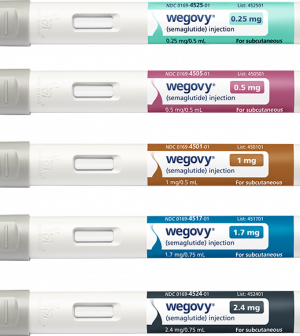- Could Your Grocery Store Meat Be Causing Recurring UTIs?
- Are You Making This Expensive Thermostat Error This Winter?
- Recognizing the Signs of Hypothyroidism
- 10 Strategies to Overcome Insomnia
- Could Artificial Sweeteners Be Aging the Brain Faster?
- Techniques for Soothing Your Nervous System
- Does the Water in Your House Smell Funny? Here’s Why
- Can a Daily Dose of Apple Cider Vinegar Actually Aid Weight Loss?
- 6 Health Beverages That Can Actually Spike Your Blood Sugar
- Treatment Options for Social Anxiety Disorder
FDA Finds No Link to Suicide With Drugs Like Wegovy, Ozempic

Drugs like Wegovy and Ozempic, which have become a wildly popular way to lose weight or battle diabetes, show no link to suicidal thoughts or actions, the U.S. Food and Drug Administration said Thursday.
“Our preliminary evaluation has not found evidence that use of these medicines causes suicidal thoughts or actions,” an FDA review released Thursday stated.
Still, the agency noted officials can’t rule out that “a small risk may exist,” and it will continue to look into similar reports involving this class of weight-loss drugs, known as GLP-1 medications.
The FDA review comes on the heels of a study funded by the National Institutes of Health that showed people taking semaglutide, the active ingredient in both Ozempic and Wegovy, had a lower risk of suicidal thoughts than those taking other drugs to treat obesity and diabetes.
In that study, researchers tracked over 240,000 obese people and more than 1.5 million people with type 2 diabetes. They looked at the risk of suicidal ideation within six months of starting the medicines, as well as at later times.
At six months, it found that among people taking the drug for weight loss, semaglutide was linked to a 73% lower risk of first-time suicidal ideation and a 56% lower risk of recurrent suicidal ideation. The drugs that semaglutide was compared to included bupropion, naltrexone, orlistat, topiramate and phentermine.
For people with type 2 diabetes, the reductions were 64% and 49%, respectively. Here, the drugs that semaglutide was compared to included insulin, metformin and newer classes of medications known as DPP-4 and SGLT-2 inhibitors.
Study author Dr. Rong Xu, a professor of biomedical informatics at Case Western Reserve University School of Medicine in Cleveland, told CNN that she decided to look into the issue after European regulators opened a probe into semaglutide and reports of suicidal thoughts last summer.
Even though semaglutide was associated with a lower risk of suicidal ideation in the NIH study, the investigators wrote in a research briefing that the data “do not yet justify off-label treatment” for suicidal thoughts.
Both Wegovy and another recently approved weight-loss drug known as Zepbound have warnings in their U.S. prescribing information about the risk of suicidal behavior and ideation.
More information
Visit Drugs.com for more on weight-loss drugs.
SOURCE: U.S. Food and Drug Administration, news release, Jan. 11, 2024; Associated Press; CNN
Source: HealthDay
Copyright © 2026 HealthDay. All rights reserved.










